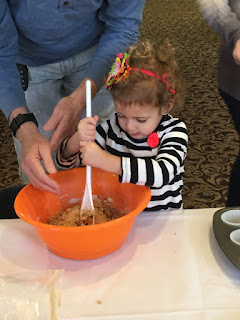Never a fan of homework as a parent or teacher, the great debate has really hit home for me recently. As a recently retired teacher, friends, neighbors, and acquaintances still ask my opinion on issues in education. I'm grateful. It means they still view me as a teacher, even though I am not currently running my own classroom, and it reaffirms my long-held belief that everyone is always entitled to my opinion! (JK - ok, not really!) Just ask me. Ask me anything. You'll see.
At my granddaughter's cooking class this week, I found myself at the Play Doh table. Sweet Pea's cooking class involves grandparents, parents, and several nannies as assistants to the little emergent chefs. It's a favorite activity that Grandma and Papa (That's us!) share with our little sweetie each week. (Retirement is everything they say it is - and more!) Kids come in and engage in free play at first. There is music, so we dance into the room and choose an activity. There is actual free play with any toys and make-believe stuff in the room. We ALWAYS have a picnic. Always. First thing - shop for plastic food and dishes, place them in a picnic basket, and sit around the school bus pretending to eat plastic portions. We love it.
There are also two tables set up - one with a craft project built around the recipe of the day. There is also a Play Doh table, set up with thematic cookie cutters, rolling pins, and lots of fresh Play Doh. Yummy and inviting. Memories come flooding back to Play Doh tables of the past. When my girls were small, we used go to Mother Toddler classes each week. I was stay at home mom during a seven year hiatus from teaching until my daughters were ready for school themselves. I remember the Mom-Tot classes as a great social outlet and loved the interpersonal aspect of the Play Doh table in particular. Actual multi-syllabic, whole sentence adult conversation for about 20 minutes a week. I made some great forever friends at the Play Doh table also!
This week at the Play Doh table, another grandma was already busy rolling and patting and cutting when we took a seat on the tiny chairs. (Sitting down is pretty easy. Standing up again though - ugh!) "So what do you think of the no homework policy?" she asked me. Aaah... an opportunity to take a stand on an issue in education. This was a little complicated though. We are grandmothers together now, but she also was once a parent of two of my third grade students. Those were the years of the ten minutes per grade level rule of thumb. For me, thirty minutes of homework for third graders consisted of reading for fifteen minutes and writing for fifteen minutes. Leftover work from the day had to be added in, but that cancelled out some much needed reading and writing practice. With many gifted students in that class (hers included), I also had ongoing project work available, allowing some class time each week, and counting on some at-home attention to it so that one project could be completed during each report card period.
I decided to focus my answer as a grandma, not a teacher. My favorite grandson's school (PSA from him as he rolls eyes: "Grandma! I'm your ONLY grandson." A mere technicality!) has a no homework policy. The public school district that I retired from seems to be headed in that direction. My grandma friend from The Play Doh table reports that her grandchildren's district has gone totally no homework. I responded that although my grandson has no official homework, he is expected to make up missed work if he has been out of school for any reason, illness or vacation. He also grabs two or three books as soon as he gets home and reads to whichever adult is there with him. He loves reading to his little sister (aka Sweet Pea) also. He then practices his writing for about ten minutes. Math comes naturally to him, and we all make up real life problems for him as we enjoy living real life with him.
My opinion is that learning at home should be natural and part of everyday life. People in real life read. (At least they should read.) Children need to be read to, read with, and to see their parents/caregivers enjoying life as a reader. It makes a big difference in those test scores, not to mention in a life worth living. Math is a real part of our everyday life, and lots of transactions throughout the day and on weekends involve math. Kids can be involved in shopping, online ordering, and cooking. Kids love to measure stuff, and fractions can be so naturally and easily introduced by measuring and cooking together. Just ask Favorite Grandson (first grader) and Sweet Pea. We do it all the time. Play Doh play is another way to work on those fractions as well as greater/less than, adding, and subtracting.
We also do science and STEAM projects together. There is always a project in process around here, and another one going on at their house. Right now, a marathon monopoly game is taking place for about twenty minutes a day at their house! Just leave it set up. Play right before bedtime or for a few minutes in the morning or after school.
Favorite Grandson working on a fairy garden.
Subtle irony: His shirt says, "The pirates ate my homework"
Sweet Pea hard at work in cooking class.
Giant flower in hair because we read Fancy Nancy before leaving for class and needed to raise the fancy bar a little.
It appears that I've changed my usual audience here to parents, but many teachers are also parents. Teachers and parents have had the great homework debate long before I was a teacher, and I'm sure will be having the same debate long after I'm gone. It can be a testy, tricky topic, or an opportunity to discuss all the ways learning can take place. Teachers, when parents ask you for "vacation homework", just tell them to have their child write a journal entry each day of their vacation and read a little each evening. They might even include maps in their journal entries. Pictures can be added digitally if the family takes a laptop or other device along for journaling, or added later with glue when they return. It makes a wonderful keepsake for that child to own forever and to share in class, and will be so much more interesting to the teacher than a folder with undone copy pages that... "Oops! We didn't have as much time for as we thought we would!" (You know.)
As for homework to be done at home each night, how about just instilling the love of learning, and the ongoing belief that learning is an all the time thing, and a natural part of our lives? Suggest reading, journaling, working on entries in their interactive notebooks from school, and ongoing home projects. Most parents will say, "What a great idea!" Those who don't may just need a little scaffolding. Try sending one journal prompt per night home, or assign a chapter to read. Start a project in school and assign a piece of it to be worked on at home.
For easy print and go resources to help parents with more open-ended homework, you might be interested in these from Rainbow City Learning:
With winter break approaching, this just might be the time to introduce your students and their families to taking more of a "learning in the wild" approach to homework. Less busy work for you and development of real and lasting life skills for your students! Enjoy every minute of your upcoming break!
I love reading your comments! Please know that it takes a little time for comments to be seen due to settings on this blog, and it's not necessary to submit twice.
For more teaching and learning ideas for December, please visit these bloggers. (Only bloggers from the Teacher Talk group are invited to link up here. Please email me at: retta.london@gmail.com if you would like to join our group!)



























